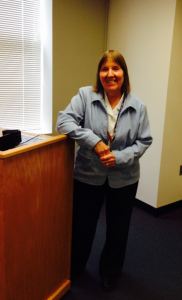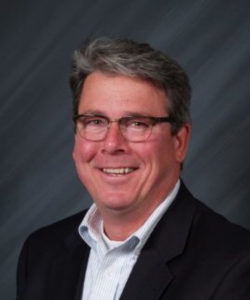You can find lots of interviewing advice on the Internet, but when it comes to interviewing for a job in respiratory care, the best advice is that which comes directly from the people who might actually hire you.
 Sally Whitten, MHS, RRT, director of respiratory care at Maine Medical Center in Portland, ME, has been teaming up with a colleague of hers for several years now to share that level of wisdom with students getting ready to graduate from the RT program in her community.
Sally Whitten, MHS, RRT, director of respiratory care at Maine Medical Center in Portland, ME, has been teaming up with a colleague of hers for several years now to share that level of wisdom with students getting ready to graduate from the RT program in her community.
In the following interview, she tells us how it’s all played out —
What led you to reach out to your local RT program to educate students about the hiring process?
 A few years ago at an AARC meeting, my friend and colleague, Bill Phelan, RRT, was asking about the interviewing process used for RT positions at Maine Medical Center. Bill’s experience is with the industry side of health care while mine is hospital based, so we were comparing notes. As an RT director, I often participate in interviews and see firsthand how unprepared many people are. I was describing for Bill some of my most challenging interviews, and he suggested I teach a class for the RT students at the local college. When I hesitated, Bill suggested we both had a responsibility to mentor those just entering the profession and he volunteered to join me in teaching this class. I contacted Southern Maine Community College’s (SMCC) respiratory care program and offered our services.
A few years ago at an AARC meeting, my friend and colleague, Bill Phelan, RRT, was asking about the interviewing process used for RT positions at Maine Medical Center. Bill’s experience is with the industry side of health care while mine is hospital based, so we were comparing notes. As an RT director, I often participate in interviews and see firsthand how unprepared many people are. I was describing for Bill some of my most challenging interviews, and he suggested I teach a class for the RT students at the local college. When I hesitated, Bill suggested we both had a responsibility to mentor those just entering the profession and he volunteered to join me in teaching this class. I contacted Southern Maine Community College’s (SMCC) respiratory care program and offered our services.
When do you usually host the session, and what does your presentation entail?
We visit SMCC every January and speak with the seniors. Our presentation stresses the importance of interview prep. Specifically:
- Developing a professional/academic resume.
- Discussion of interview dress code. Dress at least to the level of the person interviewing. Over-dressed is always better.
- Preparing to discuss your personal strengths and weaknesses and answer the most common interview questions.
- Researching the organization and preparing to articulate specifically why you want this position. Don’t make it painfully apparent to the employer that you have not bothered to investigate their operation!
- Selling yourself! What is it about you that makes you an ideal candidate?
- Be aware of your social media presence. Google yourself — your employer will. Clean up your Facebook page. Tighten up your privacy settings or delete content you wouldn’t want in the public domain. Get a LinkedIn profile.
- Be prepared to actually describe where you’d like to see yourself in the organization going forward.
- Ask specific questions regarding training and growth opportunities, RT protocol utilization, shift and assignment organization, orientation process and timeline. This is a two way conversation — the questions you ask tell the employer a lot!
One of your goals is to help students understand what you and other employers are looking for in RT job candidates. What types of skills, traits, etc., do you emphasize to them?
SMCC does an outstanding job preparing students as entry level practitioners. We trust they can perform tasks, so we let the students know we are interested in their critical thinking skills, interpersonal skills, empathy and compassion for patients, work ethic, team fit, and passion for the profession. We remind them that clinical rotations provide us ample opportunity to see those traits in action. Our interview evaluation process begins during clinical rotations. We are always looking for top candidates, and paying attention to the student’s performance.
What do you tell them about the day of the interview?
We tell them they’ll have about 30 minutes to convince their interviewer of their intelligence, “coach-ability,” curiosity, good communication skills, and development potential. Employers are listening for examples of life experience, previous employment success, academic excellence, compassion, and team play. If the applicant is prepared to address those attributes early on, they have our attention.
We also share real life stories of interviews that have gone terribly wrong so they have clear examples of what not to do or say during the interview.
What kind of reaction do you usually get from the students you speak with?
The reaction has been very positive. We receive follow up emails and thank you cards from the students telling us how much they appreciated the information. It is a rewarding experience and a wonderful way to contribute to the professional development of those just entering the field.





